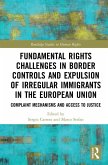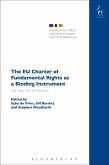This book analyses the new architecture for the protection of fundamental rights in Europe after the entry into force of the Lisbon Treaty. As a starting point, it identifies how the EU has gained a prominent role in promoting and protecting fundamental rights at European level despite the absence of an unlimited mandate to address fundamental rights violations. This new setting affects the traditional relationship between the EU, the ECHR system and the Member States and, in the absence of EU accession to the ECHR, enhances the risk of tensions and conflicts between the case law of the two European Courts. Examples of these tensions and conflicts are explored in the Area of Freedom Security and Justice, which is one of the most fundamental rights-sensitive areas of EU law and one of the busiest areas of activity for the CJEU. The book offers new insights into existing rules on the resolution of conflicts between EU and ECHR law before mapping out techniques actually used by domestic courts to avoid or address such conflicts.
Bitte wählen Sie Ihr Anliegen aus.
Rechnungen
Retourenschein anfordern
Bestellstatus
Storno









